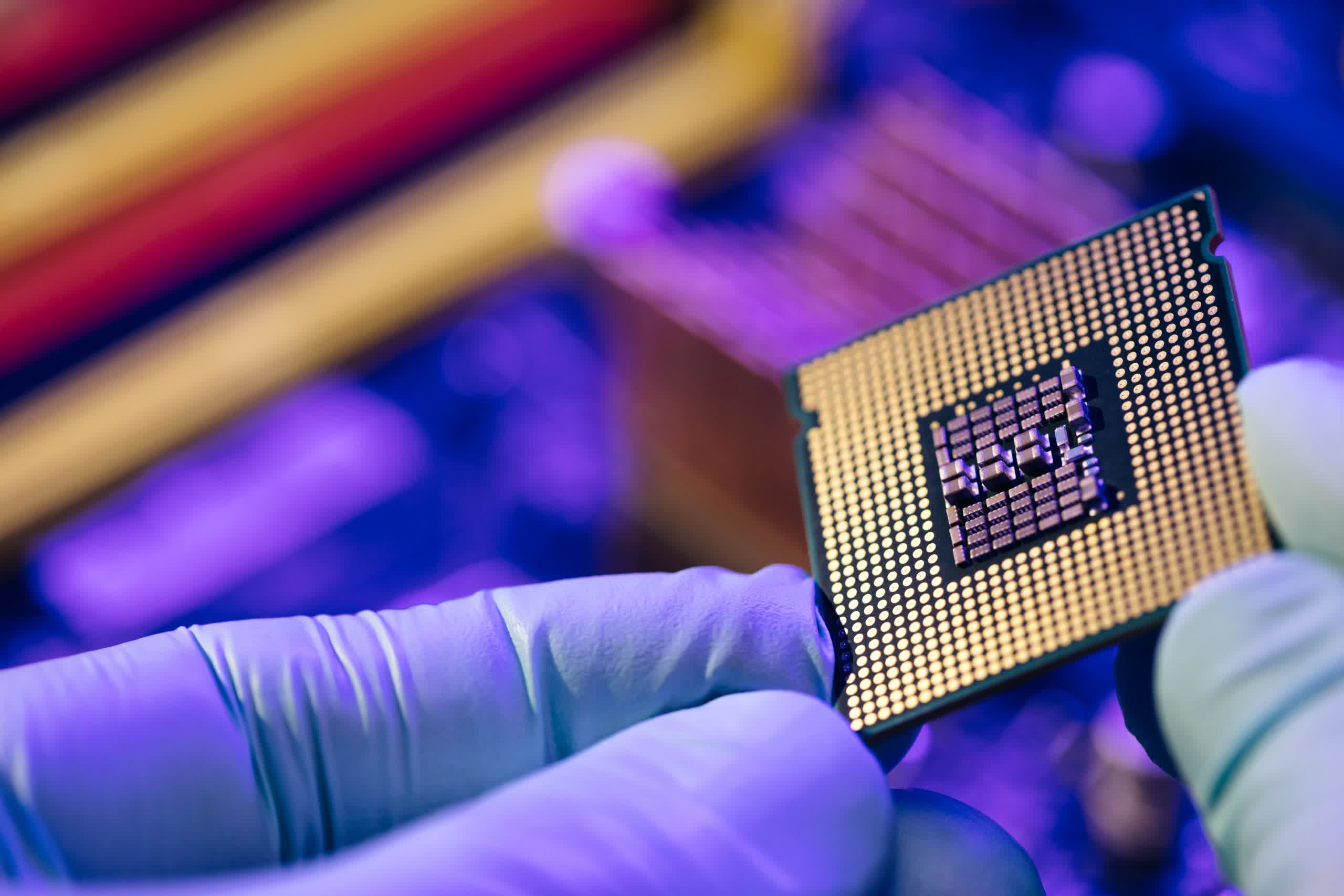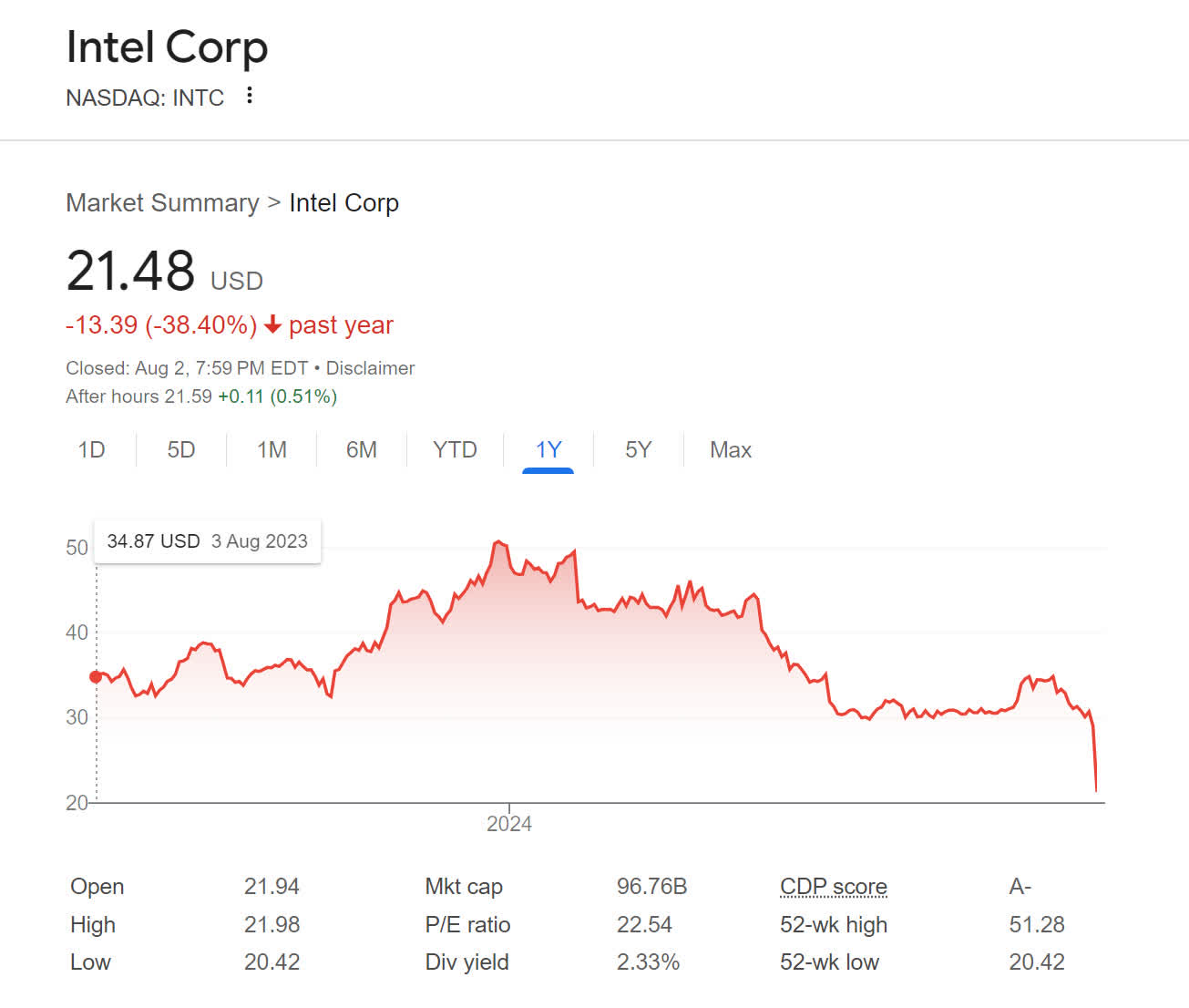Bottom line: The fact that Intel had a bad quarter is not that surprising. What is surprising is the extent to which management does not seem to have a handle on how to communicate its plans.
Last week, we reported a slew of negative Intel news: CPU crashes affecting more chips than originally expected, a warranty extension to appease current owners of those chips, yield problems on the latest mobile CPU models, the potential for a class action, and an announcement of job cuts. In hindsight, it all seemed to be a prelude to the stock plunge that followed on Friday when the company announced its latest quarterly results.
Intel reported Q2 earnings and the numbers were not good. Revenue of $12.8 billion missed the consensus of $12.9 billion, and EPS of $0.02 was well below expectations of $0.10. The guidance was even worse, with expected Q3 revenue of $12.5 billion to $13.5 billion, below the consensus of $14.3 billion, and an expected loss per share of ($0.03), compared to the consensus of $0.31.
It's hard to grasp just how bad these numbers are, although the 20+% stock sell-off on Friday provides a succinct summary. The earnings call didn't help either. Putting it diplomatically, management's commentary and responses to questions did not improve the situation.
You may not be surprised by these numbers. A few months back, we pointed out that this year would be very hard for Intel. The company's future depends on turning around its manufacturing process, but we won't see that reflected in the numbers until late 2025 at the earliest. Until then, Intel's products will struggle to support the financials.
The company claims it didn't lose share this quarter in its main markets, but instead, they cut prices sharply to hold onto that share. Adding to that, the transition to new manufacturing processes internally (which always impacts gross margins) and more products manufactured by TSMC have led to the margin implosion we're seeing now. And maybe now is not the right time to mention that TSMC is raising prices…
So, none of these results are surprising, but what is surprising is the amount of uncertainty management injected into the process. Both their prepared remarks and answers reflect the gnawing cultural issues that we think have always been at the heart of Intel's woes. The biggest problem analysts encountered on the call was the company's reluctance to concede that they have made mistakes somewhere along the line.
For instance, in response to this quarter's numbers, the company is implementing a massive reduction in operating expenses, including cutting 15% of their (already reduced) workforce. They are also cutting their capex plans for the year. However, the company insisted that these cuts would not hurt their growth prospects. They repeatedly identified cost savings in their operations, which they are now implementing. But they can't have it both ways.

Cutting costs today has to impact the timing of their manufacturing ramp and product launches. The company largely maintains this is not the case. This raises the question of why they didn't make these cuts earlier. Either the cuts impact their prospects, or they should have made the cuts part of their turnaround plan a year ago.
Earlier this year, the company held an analyst event to unveil its Foundry unit, but it then took them three months to unveil the financials for that business. We interpreted this as a messaging misstep, where the company just assumed that their technology would impress everyone enough that the financials would be an afterthought. And here we are four months later with one more shoe dropping.
A truism in communications is to lump all the bad news together at one time; dribbling it out over time heightens the pain of its impact. We understand Intel had reasons beyond their control for the timing of some of these items, but so many consistent missteps heighten our impression that they don't grasp how to communicate their changes. More worrisome, they seem to have lost touch with the market.
Last quarter, we commented that management was risking its credibility:
Credibility is what matters most now, more than growth, more than technology… we worry the company's history and culture may stand in its way [of rebuilding that credibility]. The company still has some of the bad habits it developed when it was the market leader. Chief among those is assuming that investors believe their comments about the market.
A year ago, we wrote that "Intel may have turned the corner", and almost every financial announcement since then has proved that prediction wrong.
To be clear, we think the company has a messaging problem, not a business problem. We actually think they are doing all the right things to run the business. For us, the biggest risk in these latest results is that the Board loses its nerve and changes course. That would be a colossal mistake. That being said, the management team needs to take some very major steps to turn around their perception among investors.
Six years ago, we wrote about the potential for Intel to go private. In that piece, we pointed out the chief benefit of being private would be the ability to make massive changes without the constant scrutiny of the public markets. As much as we no longer agree with the financial motivations of that post, we think that sentiment about the Street's spotlight remains valid. Intel has at least another 18 months – six quarters – of hard times ahead. We still believe they can achieve that turnaround, but they have to radically improve the way in which they speak to the market.

